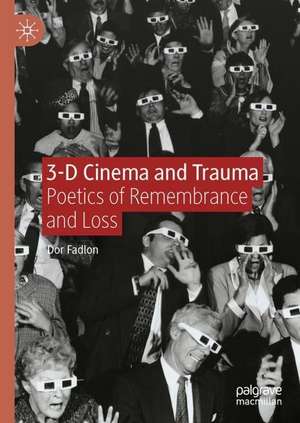3-D Cinema and Trauma: Poetics of Remembrance and Loss
Autor Dor Fadlonen Limba Engleză Hardback – 17 dec 2022
| Toate formatele și edițiile | Preț | Express |
|---|---|---|
| Paperback (1) | 778.94 lei 6-8 săpt. | |
| Springer International Publishing – 17 dec 2023 | 778.94 lei 6-8 săpt. | |
| Hardback (1) | 784.13 lei 6-8 săpt. | |
| Springer International Publishing – 17 dec 2022 | 784.13 lei 6-8 săpt. |
Preț: 784.13 lei
Preț vechi: 956.26 lei
-18% Nou
Puncte Express: 1176
Preț estimativ în valută:
150.09€ • 163.09$ • 126.16£
150.09€ • 163.09$ • 126.16£
Carte tipărită la comandă
Livrare economică 21 aprilie-05 mai
Preluare comenzi: 021 569.72.76
Specificații
ISBN-13: 9783031128202
ISBN-10: 3031128206
Pagini: 283
Ilustrații: XI, 283 p. 17 illus. in color.
Dimensiuni: 148 x 210 mm
Greutate: 0.5 kg
Ediția:1st ed. 2022
Editura: Springer International Publishing
Colecția Palgrave Macmillan
Locul publicării:Cham, Switzerland
ISBN-10: 3031128206
Pagini: 283
Ilustrații: XI, 283 p. 17 illus. in color.
Dimensiuni: 148 x 210 mm
Greutate: 0.5 kg
Ediția:1st ed. 2022
Editura: Springer International Publishing
Colecția Palgrave Macmillan
Locul publicării:Cham, Switzerland
Cuprins
Chapter 1. Introduction.- Part I: History and Trauma in 3-D Cinema of The Fifties.- Chapter 2. They Won’t Believe It Back Home: 3-D Cinema, Trauma, and Representation.- Chapter 3. Films that Ache, Films that Injure: 3-D Cinema and The Body.- Chapter 4. Any-space-whatever and Radioactive Fossils: 3-D cinema meets Deleuze.- Part II: Digital 3-D Cinema and September 11.- Chapter 5. Which Story to Believe? Mediating Trauma in Digital 3-D Cinema.- Chapter 6. Becoming Bodies and Empowering Kinaesthesia.- Chapter 7. From Bodies to Worlding.- Chapter 8. Deleuze and The Traumatic Temporalities of Digital 3-D Cinema.- Part III: Ongoing Fascinations.- Chapter 9. Documentary and 3-D cinema: Preserving Absence.- Chapter 10. 3-D Sex.- Chapter 11. 3-D Horror Cinema of The Eighties.- Chapter 12. Conclusion.
Notă biografică
Dor Fadlon is a researcher and filmmaker exploring the intersections of cinema, technology, and culture. He holds a PhD from Victoria University of Wellington and was a Golda Meir Postdoctoral Fellow in the Noah Mozes Department of Communication and Journalism, Hebrew University Of Jerusalem. Currently Dor is a lecturer at Steve Tisch School of Film and Television, Tel Aviv University, where he offers courses on film and visual culture, including violence on screen, film and technology and 3D Cinema.
Textul de pe ultima copertă
In this erudite book, Dor Fadlon develops a most compelling account of 3D cinema as telling of transformations in cultural trauma in America from the Cold War to the Way on Terror — and from analog to digital. Fadlon adds here a crucial, perviously missing, dimension (literally!) in understanding the social life trauma as technologically mediated. This book will prove valuable to those interested in critically analyzing the intersections of film studies and trauma studies.
- Amit Pinchevski, Professor of Communication, Department of Communication and Journalism, The Hebrew University of Jerusalem. Author of Transmitted Wounds: Media and the Mediation of Trauma
This book examines 3D cinema across the early 1950s, the early 1980s, and from 2009 to 2014, providing for the first time not only a connection between 3D cinema and historical trauma but also a consideration of 3D aesthetics from a cultural perspective. The main argument of the book is that 3D cinema possesses a privileged potential to engage with trauma. Exploring questions of representation, embodiment and temporality in 3-D cinema, the book takes an interdisciplinary approach, offering a compelling analysis to a combination of box office favorites and more obscure films, ranging across genres such as horror, erotica, fantasy, science fiction, and documentaries. Weaving theoretical discussions and film analysis this book renders complex theoretical frameworks such as Deleuze and trauma theory accessible.
Dor Fadlon is a researcher and filmmaker exploring the intersections of cinema, technology, and culture. He holds a PhD from Victoria University of Wellington and was a Golda Meir Postdoctoral Fellow in the Noah Mozes Department of Communication and Journalism, Hebrew University Of Jerusalem. Currently Dor is a lecturer at Steve Tisch School of Film and Television, Tel Aviv University, where he offers courses on film and visual culture, including violence on screen, film and technology and 3D Cinema.
Caracteristici
Examines 3-D cinema across the early 1950s, the early 1980s, and from 2009 to 2014 Considers 3-D cinema from a cultural perspective Argues that 3-D cinema possesses a privileged potential to engage with trauma
